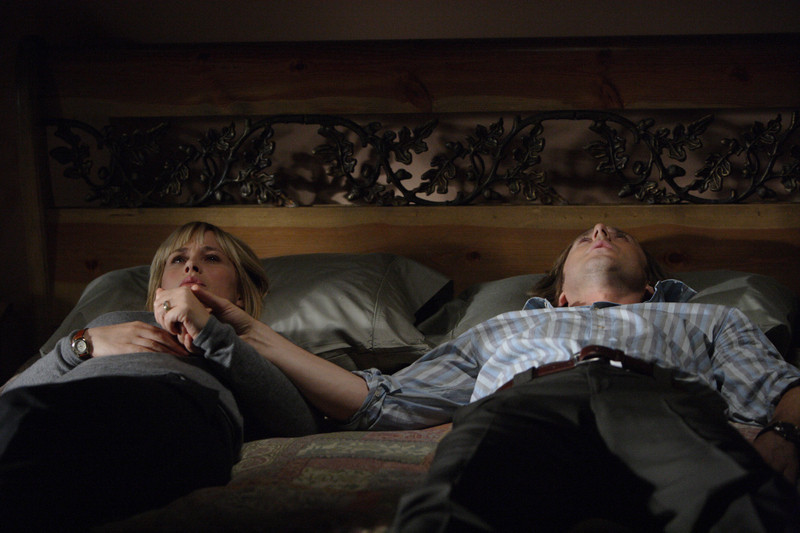In the Blog
A Supernatural Work/Life Balance
“Those ivory shoulders are a throwback to Old Hollywood. Even though her body is tiny (5’1”), it’s plush and lush. In fact, she embodies all the best contradictions. Half luminous angel, half tomboy… Sultry as a torch singer and shy as a convent girl.”
Nerve.com had this to say about Patricia Arquette when they crowned her “crush of the week” back in 2005. Her title was specific to her role on the television show Medium, which they described as “a suburban wife who channels an otherworld of violence,death, grief..no surprise either that she makes supernatural powers seem natural.” Medium is indeed a show of dualities, insisting that one side can never exist without the other.

I’ve just spent the last few days working my way through the third season of Medium on DVD, and although deep in my heart I always knew the show was somewhat groundbreaking in it’s potrayal of a wife , mother and professional woman, I am now certain that it’s my favorite depiction of domestic life/work balance on television today. Add to that the joy I experience via the thoughtful, realistic and often hilarious writing of Allison and Joe Dubois’ relationship, and I’m smitten. Believe me when I say I think this show is feminist, and I give credit to the show’s writers. I’ve never seen a husband and wife couple written in such a realistic, sympathetic and progressive way on mainstream television.
On the surface Medium is your typical prime-time supernatural crime drama, based on the real-life Allison Dubois, a self-proclaimed medium who uses her psychic abilities as a jury consultant and to help law enforcement agencies solve crimes. But from its inception, the show has focused not only the psychic solving of often brutal crimes, but on Allison’s family life with her aerospace engineer husband Joe and her three children, Marie, Bridgette and Ariel (who also, often problematically and humourously, share the beginnings of Allison’s gift.)
It’s a case of truth being better than fiction; coupling a scientific mind grounded in reality (Joe) with a woman with a “special gift” often faced with skepticism. Her family dynamic is always fundamental to the solving of every crime, and rather than Allison being the image of wifely and maternal perfection, she is flawed in ways most women can relate to. She’s prone to over-reaction, the occasional beer to drown her problems, and driven by what appears to be misguided visions and a healthy dose of self-righteousness. Surrounded by male co-workers who believe in Allison’s talents but tend to tell her she’s “too hasty” with her crime-solving advice, Allison is respected because she is always (in her own way) right about her feelings.
And despite the fact that Joe is, on the surface, the voice of (masculine) rational reason, he too is vulnerable; in season three he has a good cry when his wife returns to him unscathed (a beautiful, tender, touching moment that makes him look strong as opposed to weak - one of the finest I’ve ever seen) and suffers from post-traumatic stress disorder, the mental and emotional ramifications of being taken hostage, an incident that he never fully recovers from. Joe can be Allison’s strength in times of crisis, but he can also fall apart (and as Thea pointed out to me, be an asshole.) He takes the kids to school and he makes them breakfast. He loses his job to stress. He’s wrong. He’s human.
From buddytv.com:
Joe has redefined the role of TV “background husband.” His unflagging support of and belief in Allison is a key contributing factor to the audience’s support and belief in her. He is the everyman - the voice of reason and logic when things are teetering on the ledge of the freak-a-deak abyss. When Allison wakes up in the middle of the night from her most recent psych-adelic trip in dreamscape and immediately wants to call D.A. Devalos, it is Joe who asks: “Is this really something that can’t wait until morning?” Even though it never really can wait, it is still the logical question to ask.
Their relationship turns the “women are feeling/men are reason” dichotomy on its head. While feminine intuition is celebrated as a gift on this show (and the stereotypical “if I don’t see it, it’s not there” machismo-cop logic of Law and Order and CSI is debunked,) it’s clear that it’s not always that black and white - Joe’s wry, rational character traits are fundamental to Allison’s solving of every crime, while she helps him navigate his own professional and domestic life in a variety of natural and supernatural ways. Even the children are depicted in a realisic way; Ariel and Bridgette’s burgeoning psychic gifts are respected as powerful in the family, despite their tender ages and often strange (and comedic) realizations.
There is nothing really sensational about the conflicts that exist at home for the Dubois family, yet they entertain because they are relatable; Joe and Allison argue, discuss and love in a way we can understand. The Chicago Tribune called the concept “unflashy inventiveness.” The crimes depicted on the show always appear to be a background created to highlight what’s really important on the show.
Allison is a professional woman who balances work and life, making it look realistically tricky yet possible. She can be good at (and respected for) what she does professionally and, with Joe’s less than perfect but always admirable help, raise her kids in a loving, supportive way. They’re so extremely “normal” they become a fantasy; somehow with their messy living room, bickering, constant pyjama wearing and screaming children, they’re sexy.
Crush-worthy if you will.



